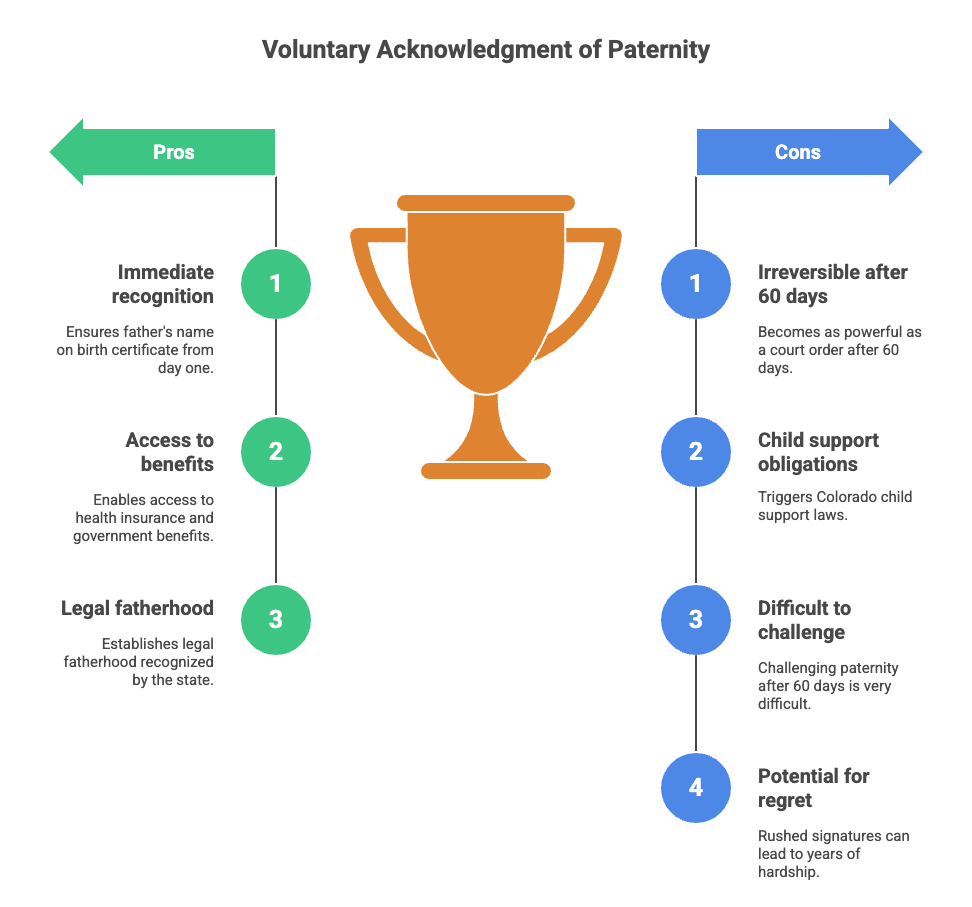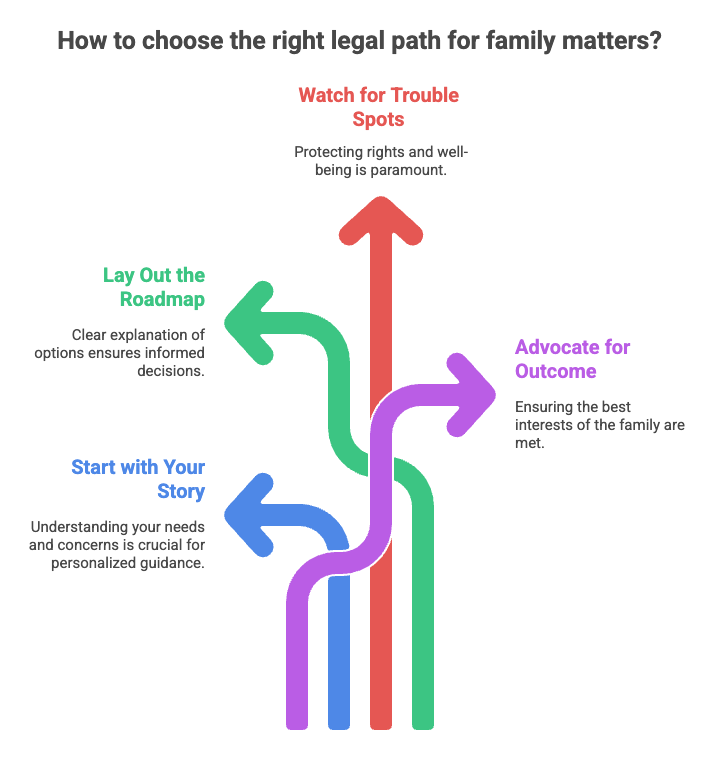- Why Paternity Matters, And Why It's So Confusing
- What Is a Voluntary Acknowledgment of Paternity (AOP)?
- When Is an AOP the "Right" Path?
- When You Should Pursue a Court-Ordered Paternity Case
- Pros and Cons, AOP vs. Court
- Common Misconceptions About Paternity in Colorado
- The Role of DNA Testing in Colorado Paternity Cases
- How These Choices Affect Real Families
- How We Help Parents Like You Make the Right Choice
- Experience You Can Count On (And Why That Matters)
- Frequently Asked Questions About Establishing Paternity in Colorado
- When in Doubt, Get Advice, Here's Why
- The Bottom Line: Choose Strength, Clarity, and Real Support

Let’s talk straight for a minute. If you’re an unmarried parent in Colorado staring down the barrel of a “Who’s the legal father?” question, you’re not alone, and honestly, you’re tackling one of the most important decisions you might ever make for your family. It can feel overwhelming: legal parentage, child support, custody rights, future peace of mind, it’s all suddenly on the table. And depending which path you choose, signing a Voluntary Acknowledgment of Paternity (AOP) or heading to court, the outcomes (for better or worse) can last a lifetime.
I’ve seen countless parents walk into Jones Law Firm with a mix of confusion, stress, and sometimes even fear about this exact issue. The stakes are real, but the good news is this: you don’t have to figure it out alone. Let’s clear up the noise and dig into what each path really means for you and your child.
Why Paternity Matters, And Why It’s So Confusing
Okay, picture this: you’re in the hospital, completely exhausted, the baby’s just been born, and the nurse hands you a “quick” form to sign about paternity. Maybe you’ve heard that the AOP is just a formality. Or maybe friends say, “Don’t worry, just sign everything and sort it out later.” The trouble? That one signature can set off a domino effect: from child support to parenting rights, to your ability to even see your child down the line.
And if you’re researching this because you’re already home and nobody really explained what you signed? That’s normal, too. I’ve met folks who weren’t sure if they were officially the child’s parent in the eyes of Colorado law, some didn’t even realize what rights (or obligations) they had created with a quick signature or a missed court date.
Sound familiar? You’re not alone.
We get lots of calls from people, in fact, probably far more than you’d expect, who simply want to do right by their child but aren’t sure if signing the AOP form is the safest way… or if going to court is the only real answer. Let’s break both options down in everyday terms.
What Is a Voluntary Acknowledgment of Paternity (AOP)?
Here’s the plain truth: the AOP is Colorado’s way of letting both parents (if they agree) tell the legal system, “We know who the dad is. No need for a judge or a DNA test.” It’s a written form, officially named the “Voluntary Acknowledgment of Paternity”, and, believe it or not, it’s pretty easy to sign. But there are hidden risks.
When and How Is the AOP Signed?
- At the hospital: Most often, you’ll see a hospital staffer hand new parents the AOP form shortly after birth, when filling out the birth certificate info. It honestly looks and feels like ‘just another form.’
- Later on: Didn’t sign at birth? No worries (yet). You can complete the AOP at your local child support office or the Department of Public Health and Environment (Colorado Vital Records) anytime after the baby’s born.
A lot of parents do this to make sure dad’s name is on the birth certificate from day one, or to get access to things like health insurance or government benefits that require legal paternity.
What Happens After You Sign?
The form isn’t locked in right away. Technically, both people can change their minds within 60 days of filing. But once those 60 days pass? The AOP is just as powerful as a court order.
Your legal status as a parent is official. That means:
- All Colorado child support laws apply.
- The state recognizes you as the child’s legal father for life.
- Challenging it after those 60 days is very difficult, even with DNA evidence.
Real-World Warning
“We advise clients before they sign anything, because one rushed signature can create years of hardship.”
That’s not just a soundbite; we’ve seen more than one parent, usually a dad under family or social pressure, sign the AOP only to realize months or years later that there are serious doubts about paternity. Undoing it? Incredibly tough. In some cases, impossible.

When Is an AOP the “Right” Path?
Let’s be fair. Sometimes, the voluntary AOP form is the perfect solution.
AOP Makes Sense If:
- You both agree on paternity. There’s absolutely no doubt, and no one will contest it later, that the person signing is the biological father.
- You want things official, fast. If both parents are on good terms, and there’s no dispute, why drag things through the courts when you could resolve it in a day?
- You need access. Want the father’s name on the birth certificate without waiting for hearings? Need health insurance for your child? Schools or other agencies often require legal paternity records.
A Relatable Example
I worked with a couple, Emily and Chris, not long ago. They had split up before the baby arrived, but both were committed to co-parenting and agreed 100% that Chris was the father. They completed the AOP the first week the baby was home, and it was a relief, no courtroom stress, no delays, just straight to building their family life. For them, the simplicity and clarity of the AOP made all the difference.
But… Don’t Rush
Even loving, friendly situations can go sideways if someone later has doubts or new facts come to light. Once the AOP is past the 60-day mark, reversing it is like asking the Broncos to undo a bad game, it’s legally possible in theory, but the bar is sky-high. Once it’s done, it’s (almost always) done.
When You Should Pursue a Court-Ordered Paternity Case
If anything about your situation feels off, if there’s uncertainty, tension, or even silence, don’t be afraid to say “wait.” A court order might be the better (and safer) path for you and your child.
Go to Court If:
- There’s any doubt about biological paternity. Don’t gamble with a signature. The court can require a genetic (DNA) test, providing concrete answers that protect everyone involved.
- One parent is uncooperative or unwilling. If the other person won’t sign the AOP or dodges your questions, the court can step in to ensure fairness.
- You need a package deal. The AOP only addresses paternity. If you want official custody, parenting time, or financial support orders from day one, the court is your best route.
- Your rights (or your child’s rights) are at risk. Sometimes, people sign things under pressure from family, partners, or even hospital staff. Court can slow things down, add a neutral party (the judge), and keep everyone honest.
Another Real-World Story
We worked with “Brian” (not his real name), who was told to “just sign the AOP now and we’ll figure out visitation later.” Six months later, he discovered that despite having signed the AOP, he had zero visitation rights and had to go to court separately to even see his child.
His biggest regret? Not talking to a lawyer before signing.
Court Is Slower, But Sometimes That’s A Good Thing
Court takes time, yes, but with time comes the ability to look at everything: paternity, custody, parenting time, child support, medical coverage, decision-making. If you want the whole picture, this is where you get it.
Pros and Cons, AOP vs. Court
Let’s do a simple head-to-head:
| Factor | AOP (Voluntary Acknowledgment of Paternity Colorado) | Court Order |
| Speed | Fast, days or a couple weeks. | Slower, can be a few months. |
| Certainty | Relies on both parents’ honesty and understanding. Easy to make mistakes. | DNA, testimony, and judge’s finding are binding and thorough. |
| Custody Rights | Not included. Father may need more court steps for visitation or decision-making. | All issues (paternity, custody, parenting time, support) can be addressed together. |
| Legal Advice Needed | Highly recommended (but often skipped). | Absolutely recommended, process is complex and rights are at stake. |
| Undoing It | Nearly impossible after 60 days, even with DNA. | Requires strong evidence, but process ensures you don’t get locked in prematurely. |
In plain English: If you want “official dad” status and you both agree, AOP works. But if there’s any doubt, or you want the court’s backing on parenting time and child support, skip the form and get the judge involved from the start.
Common Misconceptions About Paternity in Colorado
I can’t count how many times I’ve heard of these:
- “If I sign the AOP, I automatically get custody and visitation rights.”
Not so fast! The AOP only establishes legal paternity. It doesn’t guarantee you any parenting time, decision-making authority, or protections. If you want those rights clearly defined, you need to go to court and get an official ruling on parental responsibilities. - “A paternity test is always required.”
Nope. If both parents sign the AOP, no DNA test is required in Colorado. But if there’s any uncertainty, court is the only way you’ll get a legally binding DNA determination. - “Only fathers need to worry about this.”
Actually, mothers can be equally affected, especially if there’s potential for future disputes, or questions about who will be financially responsible. Clearing up paternity upfront can save years of headaches. - “You can always reverse the AOP if you make a mistake.”
This one causes the most heartbreak. The truth is, after 60 days, undoing an AOP is almost impossible unless you prove extreme fraud, duress, or a substantial legal error. For most people, the door closes quickly.
If you’re second-guessing what you’ve been told by friends, family, or even the hospital staff, trust your gut. This is one of those moments where getting the facts, before you sign, is worth its weight in gold.
The Role of DNA Testing in Colorado Paternity Cases
You’ve probably seen those “Who’s the father?” moments on daytime TV. In reality, Colorado’s courts rely on DNA testing when there’s a real question about paternity. If paternity is challenged, the judge can order both parents and the child to take a genetic test, which is nearly foolproof.
When does the court order a DNA test?
- If one parent denies paternity or opposes the AOP.
- When a third party (like child support enforcement) raises a claim.
- In cases with conflicting or incomplete paperwork.
If you’re even a little uncertain, insisting on a DNA test before signing anything is a smart, and responsible, step. It protects your rights and your child’s best interests, even if it delays things a little.
How These Choices Affect Real Families
You might be surprised how many different family shapes and stories we see at Jones Law Firm. Some are co-parents who get along well, wanting a fast, drama-free solution. Others are navigating tougher waters, maybe there’s been a breakup, trust issues, or family pressure. Some parents have different cultural backgrounds or speak English as a second language, which can make these legal details even trickier to untangle.
Take Sarah and Michael:
Sarah wanted her child’s father to be listed, but Michael was unsure and felt pressured by Sarah’s family to sign. We paused the process, explained each option in plain language, and guided them to request a confidential paternity test. When the result confirmed parentage, everyone signed the AOP with confidence and clarity. No hurt feelings. No legal mess down the road.
And then there’s “Lisa,” who contacted us in tears after signing the AOP at her parents’ urging, even though she wasn’t certain about the father. Six months later, she learned her boyfriend might not actually be the biological dad, and legally, she was nearly out of options. These are moments where calling an experienced paternity attorney before signing anything can make all the difference.
How We Help Parents Like You Make the Right Choice
At Jones Law Firm, our role isn’t just filling out paperwork. Think of us as your guide, the one who’s seen pretty much every twist and turn this road can take. Here’s what we do (and why it matters):
1. We Start With Your Story
We don’t assume. We ask questions, listen, and get a full picture of what you want for your family’s future. That means talking through your worries, hopes, and even those nagging “what ifs.”
2. We Lay Out the Roadmap
We spell out your options in plain language, AOP, court order, DNA testing, parenting plans, and explain what each choice really means for you down the line.
3. We Watch for Trouble Spots
If there’s any sign you’re being pressured, rushed, or misled, we raise the red flag and put the brakes on. Our goal? Protect your rights and your child’s well-being at every step.
4. We Advocate for the Outcome You Need
Whether you need to challenge an AOP, establish or dispute paternity in court, or build a parenting plan for the years ahead, we’re stubborn about one thing: the best interests of you and your child.
As one of our clients put it,
“They didn’t just handle the paperwork, they helped me understand exactly what I was signing, and why.”
That’s the heart of what we do. We leave no one in the dark, no matter how bewildering the process might seem at first.

Experience You Can Count On (And Why That Matters)
We know, every law firm says they have experience. So here’s what that looks like in practice for us:
- 25+ years serving Colorado families. We’ve resolved more than 4,000 cases, from straightforward AOP filings to fiercely contested paternity disputes in courtrooms across the state.
- Award-winning expertise. Our Managing Attorney, April D. Jones, leads the way in combining strategic, team-based advocacy with empathy and precision.
- Tailored solutions, not cookie-cutter advice. We recognize that every family and every situation is unique, and we take the time to understand what success looks like for YOU.
- Consistent client satisfaction. Our average review? 4.8 out of 5. We’re proud of that, not just for the results, but for the way we treat every client with care and respect.
We Choose Sides. Yours. That’s not just a tagline, it’s how we show up for you, every step, every case.
Frequently Asked Questions About Establishing Paternity in Colorado
Do I have to use the hospital form, or can I wait and do the AOP later?
You can do it later! The AOP can be signed any time after birth, at county child support offices or with the Colorado Department of Public Health and Environment.
Can I rescind the AOP if I made a mistake?
Within 60 days: yes (by filing a specific revocation). After that: it’s difficult, and you must prove fraud or major error in court, which is rare.
If a DNA test shows I’m not the father and I’ve already signed the AOP, what happens?
Unfortunately, after 60 days, you may still be legally recognized as the father, even if the science says otherwise. That’s why it’s absolutely crucial to press pause if you have any doubts.
Will signing the AOP affect custody automatically?
Nope. The AOP confirms paternity, but custody, decision-making, and parenting time require separate court action. Don’t assume they’re the same.
What if I’m pressured to sign by the other parent or family members?
Don’t do it. Take your time, get legal advice, and remember, the pressure you feel now is nothing compared to what you’ll feel later if things go wrong. We’re happy to talk it through, confidentially and without judgment.
When in Doubt, Get Advice, Here’s Why
Look, these decisions are big. They shape families, finances, and futures. If there’s any question, hesitation, or just a gut feeling that you want someone on your side? Reach out. Consultations are confidential. We don’t judge. We just help you see your options clearly, and support you in making the best choice for everyone involved.
If we could leave you with one last thought, it’s this: Don’t rush. Don’t sign blindly. Your child, your rights, and your future are way too important.
The Bottom Line: Choose Strength, Clarity, and Real Support
There’s no “one-size-fits-all” here. For some, the AOP is a practical, peaceful solution. For others, court brings the certainty and legal protection everyone deserves. Only you know your story, where you’re coming from and where you want your family to go next.
At Jones Law Firm, we’re committed to guiding you through each step, cutting through the confusion, and protecting what matters most: your relationship with your child and your peace of mind.
Let’s take this step together. Schedule your confidential consultation with Jones Law Firm today.
We Choose Sides. Yours. Every time.
If you’re ready for clarity, empowerment, and a steady hand on your side, contact us now.
Your family. Your future. Start here.